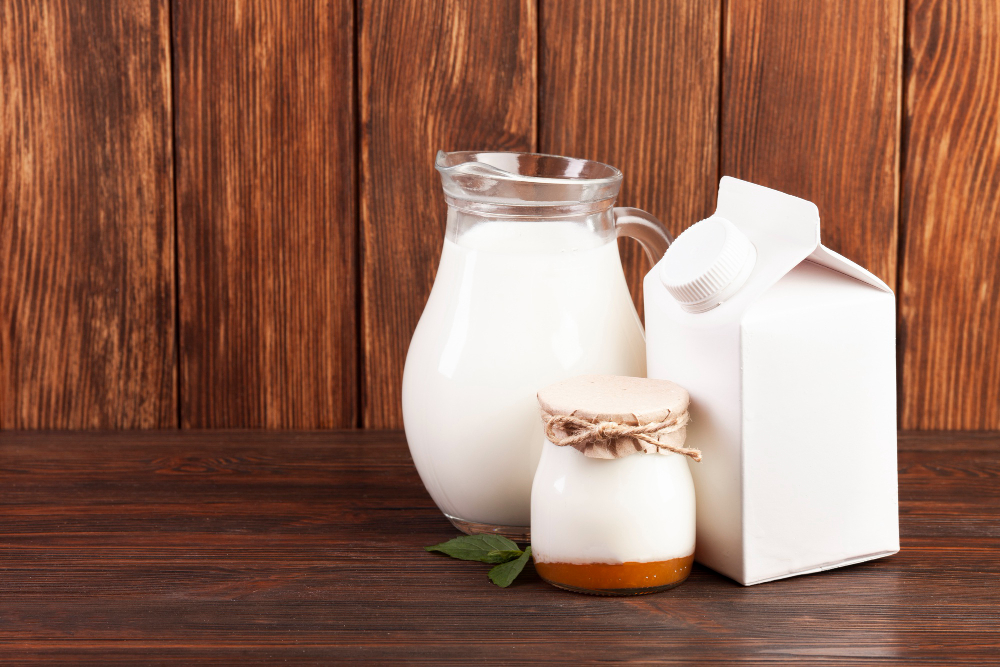The food we eat contains nutrients that are necessary for the normal functioning of bodily systems. Think of the body as a machine and food as the fuel that powers the machine. Nutrients are found in food and it is these nutrients in food that keep us healthy and provides the body with all it needs to function. Our focus in this article is on the mineral calcium and foods rich in calcium.
Calcium is a mineral, in fact, one of the essential minerals needed by the body. Calcium is known as the most abundant mineral in the body. When one thinks of calcium, what immediately comes to mind is strong bones and rightly so, because one of the major functions of calcium is its role in the formation and development of strong bones and teeth.
Fun fact: 99% of the body’s calcium is in the bones and teeth and the remaining 1% is found in blood, muscle, and other tissues.
Calcium works very closely with vitamin D. Calcium in the circulatory system, extracellular fluid, muscle, and other tissues is critical for mediating vascular contraction and vasodilatation, muscle function, nerve transmission, intracellular signalling, and the secretion of hormones. It is recommended to consume at least 1000mg of calcium daily and 1,200mg for pregnant women.
There are a few important facts to note about calcium:
- Humans cannot produce calcium. As a result, you have to get all your calcium needs from eating foods rich in calcium.
- As earlier stated, calcium works very closely with vitamin D. Think of calcium and vitamin D as twin sisters that work hand in hand to achieve a common goal. This also means that vitamin D is needed for the absorption of calcium. If your body’s vitamin D reserves are low, it cannot absorb calcium.
- Calcium is more important for women. This is shocking but true. Research has shown that calcium can relieve or ease the symptoms of premenstrual syndrome, (PMS) in women!
- The amount of calcium your body needs depends on your age. Too much calcium is bad for you. For every nutrient, it is important to get the right amount. Too little and you suffer deficiency symptoms of the nutrient while too much is bad for your health. In the case of calcium, symptoms of too much calcium include constipation, gas, and bloating. Extra calcium may also increase your risk of kidney stones. In rare cases, too much calcium can cause deposits of calcium in your blood, also known as hypercalcemia.
- Sometimes, taking calcium supplements can supply your body with the right of calcium nutrients. Most people are not able to get calcium from their diets. People who are lactose intolerant, vegan, or just not a fan of dairy products, may find it difficult to get enough calcium in their diet. It is important to talk with your doctor before taking calcium supplements.
Fun fact: One cup of low-fat or skim milk contains approximately 300mg of calcium.

Benefits Of Calcium
We have mentioned that calcium is important in the development of strong bones and teeth, but aside from this, there are other benefits of calcium. They are:
1. Bone Development: Perhaps the most common role of calcium is in the development of strong bones. This is especially important in children.
Calcium contributes to the development of bones in a growing child. After the cessation of growth, that is, when a person stops growing, calcium continues to help maintain the bones and slow down bone density loss, which is a natural part of the ageing process.
Also, menopausal women (females who have already experienced menopause) can lose bone density at a higher rate than males or younger people. They have a higher risk of developing osteoporosis, and a doctor may recommend calcium supplements for them.
2. In The Regulation Of Muscle Contraction: The body releases calcium when a nerve stimulates a muscle. This released calcium helps the proteins in the muscle carry out the work of contraction. When the body pumps the calcium out of the muscle, the muscle relaxes.
3. Benefits Of Calcium To The Cardiovascular System: Calcium is important in heart health. The role of calcium in muscular function also includes the muscles of the heart. Calcium helps in maintaining the action of the muscles of the heart. Calcium also helps to relax the smooth muscle that surrounds blood vessels.
Other functions of calcium are enzyme activity and nerve functions.
Read Also:Health Benefits Of Garlic
What Are Foods Rich In Calcium?
As earlier established, the body does not produce calcium, so it has to be gotten from the diet or through calcium supplements. We shall first discuss foods rich in calcium. They are discussed below:
1. Soy:
Tofu and other soy-based products are frequently made using calcium sulfate, a salt that preserves the texture of proteins. To meet daily calcium requirements, soy milk is frequently fortified with calcium and vitamin D. You can fulfill your daily calcium need using products such as the ones listed below: Soy milk fortified with calcium provides 300 mg per cup, tofu produced with calcium sulfate has 434 mg per half cup, and soybeans have 261 mg per cup.
2. Chia Seeds:
According to research, chia seeds are an additional nutrient-dense seed that offers 179 milligrams of calcium per ounce. You can blend chia seeds into oatmeal or yogurt or add them to smoothies and baked goods.
3. Cheese:
Low-fat cheeses are a great source of calcium. Parmesan cheese has the highest calcium level per ounce at 242 mg. Other low-fat cheeses include part-skim mozzarella, low-fat cheddar, colby, and cottage cheese. Brie and other softer cheeses are lower in calcium. Cottage cheese offers 23 grams of protein per cup. Cheese is another source of protein.
Because aged, hard cheeses have less lactose by nature, people with lactose intolerance may find them simpler to consume. Consuming dairy products may also reduce the risk of heart disease and metabolic syndrome, among other health advantages. Full-fat cheese, however, can be heavy in calories and saturated fat. Additionally, some cheeses have high sodium content, which some people may need to limit.
4. Beans:
This is unarguably one of the healthiest foods rich in calcium on the planet. They are also readily available and can be used in making many meals like the bean cake, etc. Many varieties of beans are packed with calcium. Black-eyed beans or cowpea is a very popular variety of beans. One cup of black-eyed beans contains about 24 mg of calcium. Beans are also high in fibre, protein, and micronutrients, including iron, zinc, folate, magnesium, and potassium.
5. Sardines:
These are canned mackerel fish that are added to foods. They are also popular in many households and are used in a variety of dishes. Sardines are packed with calcium because of their soft edible bones. One cann of sardines contains about 280 mg of calcium, which is about 27% of the daily value. Sardines are also high in protein, omega-3 fatty acids, and selenium which can support the health of your heart, skin, and brain.
6. Leafy Greens:
A lot of leafy green vegetables are excellent sources of calcium. Examples of leafy greens include kale, spinach, collard green, pumpkin leaves, broccoli, chard or okra.
7. Meats:,
a lot of animal food sources are consumed. Some of the best animal meats that are rich in calcium are goat meat, which has about 17 mg of calcium per 100 grams. Rabbit meat, contains a good amount of calcium. It contains about 18 mg of calcium per 100 grams. Snail meat, also has a decent amount of calcium in it.
8. Cabbages:
They are a healthy and versatile food filled with many amazing nutrients, including calcium. Cabbage is one of the most affordable sources of calcium which can be easily incorporated into most meal. Just 100 grams of cabbage contains about 40 mg of calcium, which is 4% of the daily value needed.
9. Almonds:
Many healthy nuts contain calcium and almonds are among the highest in calcium. One handful of almonds might contain about 60 mg of calcium.
10. Cocoa Powder:
Coco powder is amongst the foods rich in calcium. This is a food made from cocoa beans, which come from the plant Theobroma cacao. Organic cocoa powder is widely sold and consumed in many parts of the world. Just 100 grams of cocoa powder contains about 128mg of calcium, almost 13% of the daily value.
Other foods rich in calcium are:
- Seeds, for example, sesame seeds, chia seeds, etc.
- Yoghurt
- Cheese
- Lentils
- Whey protein
- Rhubarb
- Amaranth
- Tofu
- Edamame
- Figs
- Milk
Recommended:16 Amazing Health Benefits Of Turmeric
Conclusion
Calcium is one of the most important and abundant minerals in the body. Calcium is mostly known for its role in the development of strong bones and teeth. It however has other functions which include the regulation of muscle contraction and its role in cardiovascular health. The body does not produce calcium, so besides taking calcium supplements, one of the ways of getting the body’s daily calcium requirement is by consuming foods rich in calcium. Examples of foods rich in calcium include millet, leafy greens, sardines and many more.




